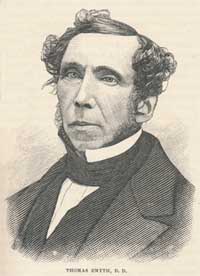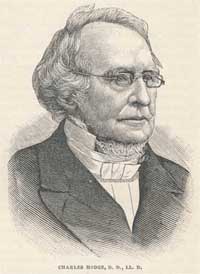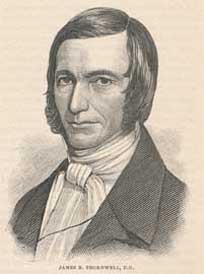 |
|
 |
Thomas Smyth [1808-1873] |
James H. Thornwell [1812-1862] |
Charles Hodge [1797-1878] |
Jure Divino Presbyterianism and The Board Debates 1841-1861 |
||
| News update: We are pleased to announce that permission has been granted by Dr. Kenneth J. Foreman, Jr., for posting of his 1977 Princeton doctoral dissertation, titled The Debate on the Administration of Missions Led by James Henley Thornwell in the Presbyterian Church, 1839-1861. The various chapters of that dissertation will be displayed more or less chronologically in the time-line shown below, with primary source materials interspersed. Most of the material linked below is provided only in PDF format, and except for the 1843 Letter to J. L. Wilson, all of these primary source documents retain the original pagination and formatting, as an aid to citation. | ||
| If you have only a passing interest in this subject, I would recommend reading the account provided by the Rev. John Bailey Adger in his autobiography. [recently available in print, here]. Most won't need more than that. The remainder of what follows is for those who need access to the fuller discussion. Adger wrote a review of the General Assembly (1860) in which these debates played such a central part [see below], and then twenty-five pages of his autobiography are spent in review of this same debate, under the title of "The Board Controversy". Adger begins his account with an intriguing comment from Dr. Benjamin Morgan Palmer, stating that this board controversy was a leftover from the Church's division of 1837 : |
Excerpt from Adger's autobiography : "The Board Controversy." |
| Dr. Palmer well remarks that there was left over a "residuary bequest"—"a sort of remainder"—from the original controversy with which the church was rent in 1837-'38 [see Palmer's Life and Letters of Thornwell, pp. 182-221.] This bequest and remainder was the board controversy. One expression which he uses in relation to this very point is liable to be misunderstood. He says, "During the period, when the church was brought under a species of vassalage to Congregationalism, the great national societies, which usurped her functions, conducted their operations by the agency of boards. The church had become familiar with that mode of action," etc. No one will deny the influence of Congregationalism upon the Presbyterian Church, especially in those portions of it most contiguous to New England; nor that in the Northwestern wilderness, where the American Education Society and the American Home Mission Society chiefly operated, there was brought about a vassalage of the Presbyterian Church to Congregationalism. Of course, Dr. Palmer did not mean to apply his remark to our church in all its parts and portions. Neither is he to be understood as meaning that our whole church had become familiar with that mode of action in the sense of becoming, in any degree, satisfied with it. The sturdy Scotch-Irish Presbyterians of Pennsylvania, Virginia, Kentucky, and the Carolinas, who constituted the bulk of our Presbyterian Church in those days, had been educated better by their fathers, and could not approve the mixing up of the church with voluntary associations. They tolerated the Plan of Union, but, from the first, they did not like it, and it was influence from such quarters that finally overthrew it. [. . .Read more] |
1837-1838 :
Foreman - The Debate on the Administration of Missions |
| Introduction Prologue : The Mind and the Classic BACKGROUND The Setting : A Brief Review of the History of the American Churches The Dilemma Posed to the American Churches by the Rise of Corporate Christian Benevolence The Presbyterian Division of 1837-1838 The Presbyterian Situation at the Close of 1838 |
1839 :
Foreman - The Debate on the Administration of Missions |
| THE DEBATE I. OPENING MOVES The Enlistment of James Henley Thornwell Breckinridge of Baltimore Opens Fire Benjamin Mosby Smith Drops Some Hints |
Prelude to the Published Controversy |
| The following three entries provide additional background to the published debates. From the Minutes of the Presbytery of South Carolina, it appears that a rather effusive commendation of the Board structure was first set forth by that Presbytery. Then, at a subsequent meeting of the Synod of South Carolina and Georgia, when action on the Presbytery's resolutions came to the floor, the majority largely adopted that commendation, but it is at this point where we first see the criticisms offered by the Rev. James Henley Thornwell, who was not quite 28 years of age at this point. His objections failed to gain support and there were only seven votes against the resolutions. Still, just three weeks later when the Southern Board of Foreign Missions issued its report, there is in that Report a strong sense of explanation and defense, presumably in reaction to Thornwell's critique. |
1840 :
Primary Sources : |
| • Excerpts from the Minutes of the Presbytery of South Carolina, 19 March 1840. • Excerpts from the Minutes of the Synod of South Carolina and Georgia, 26 November 1840. • Report of the Executive Committee of the Southern Board of Foreign Missions, 19 December 1840. |
1841 :
Foreman - The Debate on the Administration of Missions |
| II. THORNWELL VERSUS SMYTH James Henley Thornwell Writes a Classic Thomas Smyth and Walter Lowrie Cooperate The Valley of the Shadow Thomas Smyth Makes a Serious Review A Voyage Into Life Thornwell Replies to a Serious Review |
Primary Sources : |
| • Thornwell, James H., "A Calm Discussion of the Lawfulness, Scripturalness and Expediency of Ecclesiastical Boards," The Baltimore Literary and Religious Magazine, vol. 7 (1841). [It is unclear at this time as to exactly when this article appeared in 1841, but it seems safe to say that the article should be seen particularly as a response first to the Synod of South Carolina and Georgia and secondly to the Report of the Executive Committee of the Southern Board of Foreign Missions.] • Gildersleeve, Benjamin, "The Boards of the Church" - A review of Thornwell's article above, The Charleston Observer vol. XV, no. 16 (17 April 1841), page 62. [click here to view this article in its original newspaper format] ; [Gildersleeve was among those voting against Thornwell at the 1840 Synod meeting. He apparently also had a close association with Thomas Smyth, giving prominent notice of Smyth's published works in The Charleston Observer.] • Smyth, Thomas, "A Serious Review of a 'Calm Discussion of the Lawfulness, Scripturalness and Expediency of Ecclesiastical Boards,' being a Defense of the Ecclesiastical Boards of the Presbyterian Church" [Parts 1 & 2 first published in the The Baltimore Literary and Relgious Magazine, vol. 7 (1841), pp. 381 - 419; Parts 3 & 4 then printed in the successor magazine, The Spirit of the Nineteenth Century, vol. 1 (1842), pp. 26--36 and and reprinted as "Argument for Church Boards" in Collected Writings of James Henley Thornwell, vol. 4, pp. 581-615. [Our digital edition follows the pagination of Smyth's article as it appears in Vol. VI of his Works.] 1842 : • Thornwell, James H., "Reply to a 'Serious Review of a "Calm Discussion . . . ", in The Spirit of the XIX. Century, Vol. I, no. 4 (April 1842): 145-172; reprinted as "Argument against Church Boards," in John B. Adger, ed., Collected Writings of James Henley Thornwell, vol. 4, pp. 145-172. [Our digital text follows the pagination of the Adger edition] 1841-1842 : • Palmer, Benjamin Morgan, "The Board Question" - being Chapter XVI [pp. 221-231] of The Life and Letters of James Henley Thornwell (1875). |
1843 :
Foreman - The Debate on the Administration of Missions |
| III. COIT VERSUS WILSON John Calkins Coit Undertakes a Revolution Benjamin Gildersleeve Thinks Otherwise Harmony Presbytery Mutes the Blast John Leighton Wilson Demurs Coit or Wilson : The Nature of the Choice |
Primary Sources : |
||||||||||||||||||||||
| • "Letter to the Rev. John Leighton Wilson," from the Committee formed by the Presbytery of Harmony. This correspondence was published in serial form on the pages of The Charleston Observer, from 1 July 1843 to 2 September 1843. The editor of the Observer, the Rev. Benjamin Gildersleeve, in concluding publication of the "Letter" noted that it was the longest piece the Observer had ever published. So it will take some time to prepare this article for posting. It would appear that the Committee took a Thornwellian position, from which Gildersleeve dissented. In his editorial rebuttal, offered at the conclusion of the Letter, he puts forward thirteen objections, beginning with the question, "...on what ground [is] a Presbytery authorized to conduct Foreign Missions?
|
1844-1854 :
Foreman - The Debate on the Administration of Missions |
| IV. INTERLUDE : WIDER FIELDS Meanwhile, the General Assembly |
1847 :
Primary Sources : |
| • Thornwell, James H., "The General Assembly of 1847," The Southern Presbyterian Review, I.2 (September 1847): 90-96. |
Foreman - The Debate on the Administration of Missions |
| V. ROBINSON VERSUS HODGE Princeton Gets Involved; and India Missionary Rankin Offers a Statistic Charles Hodge Sheds a Dark Light Stuart Robinson Corrects Charles Hodge |
1855 :
Primary Sources : |
| • Robinson, Stuart, "More Boards in the Presbyterian Church.—Some Inquiry into Fundamental Principles." The Presbyterial Critic and Monthly Review I.5 (May 1855): 197-204. |
Foreman - The Debate on the Administration of Missions |
| VI. INTERLUDE : THE NATURE OF THE PROTAGONIST James Henley Thornwell |
1858 :
Primary Sources : |
| • Gregg, G. C., "Our Domestic Missions—The True Theory of Their Conduct and Management," The Southern Presbyterian Review XI.3 (July 1858): 402-419. |
Foreman - The Debate on the Administration of Missions |
| VII. FINAL MOVES The Two-Level Attack Systematic Benevolence : Palliative Revolution The Reformers' Pressure Increases Stuart Robinson Analyzes the Situation Three Ex-Moderators Prove Stuart Robinson Right Four Years of Uncertainty |
1860-1861 :
Foreman - The Debate on the Administration of Missions |
| VIII. CLIMAX Dr. Robert A. Archer Makes His Way Confrontation in Rochester |
Primary Sources : |
| • Adger, John B., "The General Assembly of 1860", The Southern Presbyterian Review XIII.3 (July 1860): 352-417. • Hodge, Charles, "Presbyterianism", The Biblical Repertory and Princeton Review XXXII.3 (July 1860): 546-567. • Thornwell, James H., "The Princeton Review and Presbyterianism" The Southern Presbyterian Review XIII.4 (January 1861): 757-810. |
Foreman - The Debate on the Administration of Missions |
| EPILOGUE The Terrible Swift Sword Conclusions The Classic |
We have today [04/16/2012] discovered a subsequent debate that took place in the early 1870s :
Of Boards and Committees, Debate in 1873-1874 |
| 1873 Smoot, R.K., “The General Assembly of 1873,” The Southern Presbyterian Review 24.4 (October 1873): 586-615. - [a portion of this article kicks off the renewed debate] S. K. Y., "The Sources of Church Power : The Rev. R. K. Smoot on 'Powers of the Church and Methods of Beneficence.'", The Christian Observer 52.50 (10 December 1873): 1-2. 1874 Keith, W. J., “Boards or Committees,” The Christian Observer 53.3 (21 January 1874): 1-2. [Rev. Keith died later in 1874—see The Christian Observer 53.34 (26 August 1874): 1, col. 5.] Smoot, R.K., “Legal Position of the Assembly's Committees : An Open Letter from the Rev. R. K. Smoot to the Rev. W. J. Keith,” The Christian Observer 53.4 (28 January 1874): 2. Williams, Samuel W., “Chartered Boards in Our Church, The Christian Observer 53.5 (4 February 1874): 1. Baird, E. Thompson, “The Question of Our Charters,” The Christian Observer 53.6 (11 February 1874): 1-2. Anon., “Charters for the Committees. The Legal Position of the Committees of Our Church,” The Christian Observer—Literary and Miscellaneous 53.7 (18 February 1874): 1. Leake, William J., “Chartered Boards in Our Church,” The Christian Observer—Literary and Miscellaneous 53.8 (25 February 1874): 1-2. Williams, Col. Sam. W., “The Charter of the Publication Committee,” The Christian Observer—Literary and Miscellaneous 53.9 (4 March 1874): 1. Baird, E. Thompson, “Our Charters Again,” The Christian Observer—Literary and Miscellaneous 53.12 (25 March 1874): 1-2. [Click here to view scans of Page 1 and Page 2. Baird, E.T., “Thirtieth Annual Report of the Board of Publication, The Christian Observer 53.21 (27 May 1874): 3, col. 5-6. Brown, William, E.T. Baird and J.L. Wilson, “Plan Proposed for Benevolent Contributions. The Report of the Committee, Presented to General Assembly, May 1874,” The Christian Observer 53.30 (29 July 1874): 1. H.A.B., “The Financial Schemes of the General Assembly,” The Christian Observer 53.33 (19 August 1874): 1. “Aliquis,” “The Assembly's New Scheme of Christian Benevolence,” The Christian Observer 53.34 (26 August 1874): 2, col. 5-6. “Systematic Benevolence: The Action of the West Hanover Presbytery upon the Plan Proposed by the General Assembly for Benevolent Contributions, The Christian Observer 53.36 (9 September 1874): 1. “On Benevolence,” consisting of two articles, 1. “The Plans of the Synod of Virginia and the General Assembly” and 2. “Systematic Benevolence. The Assembly's Plan,” by Rev. B. W. Moseley, The Christian Observer 53.40 (7 October 1874): 2, col. 3-6. |
Related Primary Sources : |
| • Peck, Thomas E., "The Nature and Extent of Church Power," in Ecclesiology. Richmond, VA: Presbyterian Committee of Publication, 1892; pp. 106-119. |
Foreman - The Debate on the Administration of Missions |
SELECTED BIBLIOGRAPHY |
Additional Secondary Sources : |
| • Farmer, James O., The Metaphysical Conspiracy. Macon, GA: Mercer University Press, 1999; pp. 184-187. • Thompson, Ernest Trice, Presbyterians in the South. Richmond, VA: John Knox Press, 1963. Vol. 1, pp. 511-516. • Troxel, A. Craig, "Charles Hodge on Church Boards: A Case Study in Ecclesiology," The Westminster Theological Journal, 58.2 (Fall 1996): 183-207. • Whitlock, Luder G., Jr., "Elders and Ecclesiology in the Thought of James Henley Thornwell, The Westminster Theological Journal, 37.1 (Fall 1974): 44-56. |
